北师大版(2019) 选择性必修第一册 Unit 2 Success Lesson 3 Getting to the Top 词 句 重难点 课件(共73张PPT)
文档属性
| 名称 | 北师大版(2019) 选择性必修第一册 Unit 2 Success Lesson 3 Getting to the Top 词 句 重难点 课件(共73张PPT) |
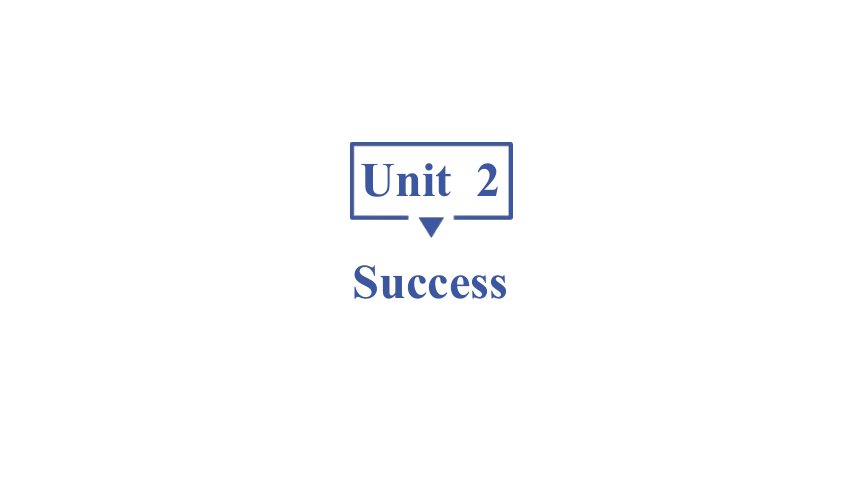
|
|
| 格式 | pptx | ||
| 文件大小 | 2.1MB | ||
| 资源类型 | 教案 | ||
| 版本资源 | 北师大版(2019) | ||
| 科目 | 英语 | ||
| 更新时间 | 2023-05-11 00:00:00 | ||
图片预览

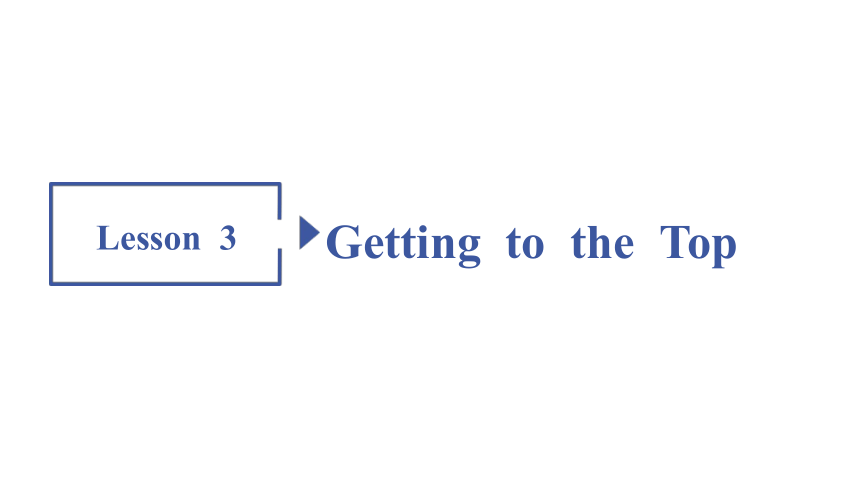
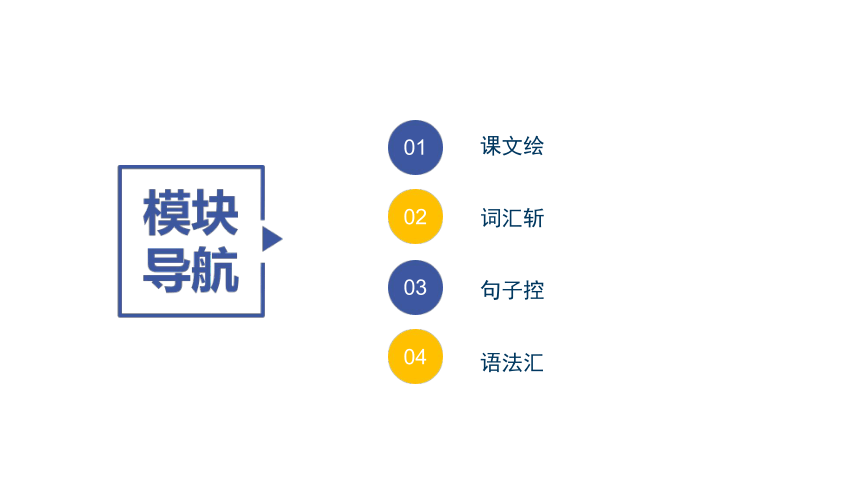
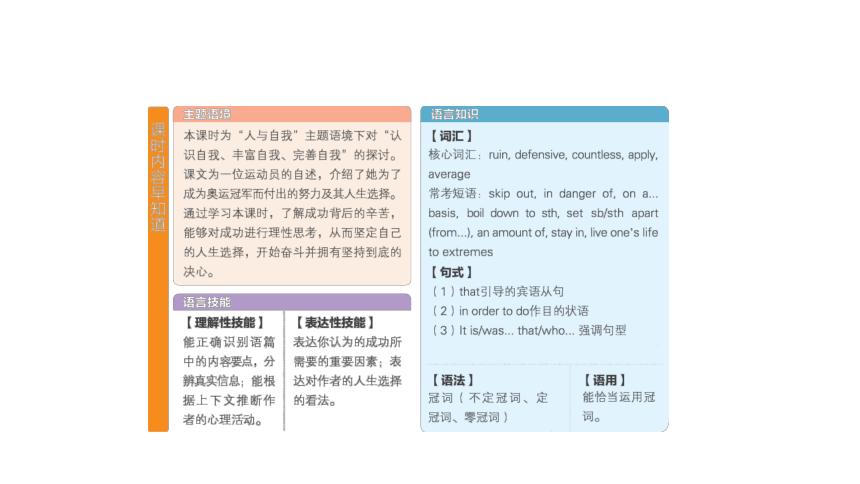
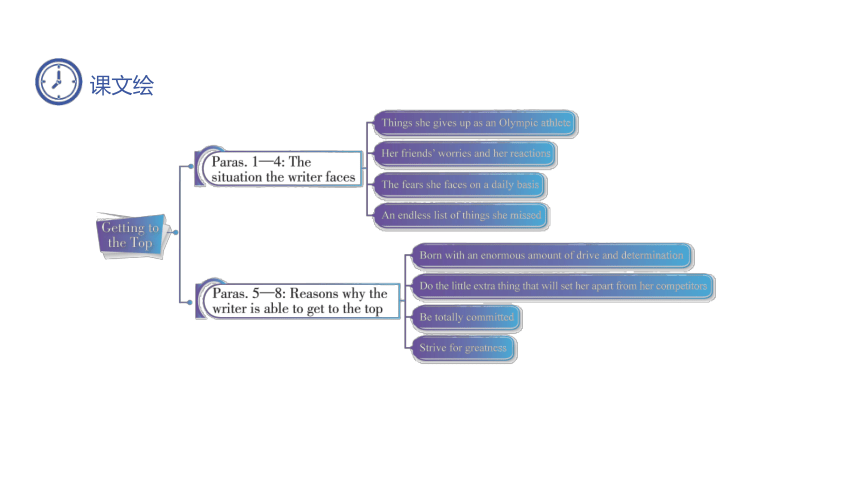
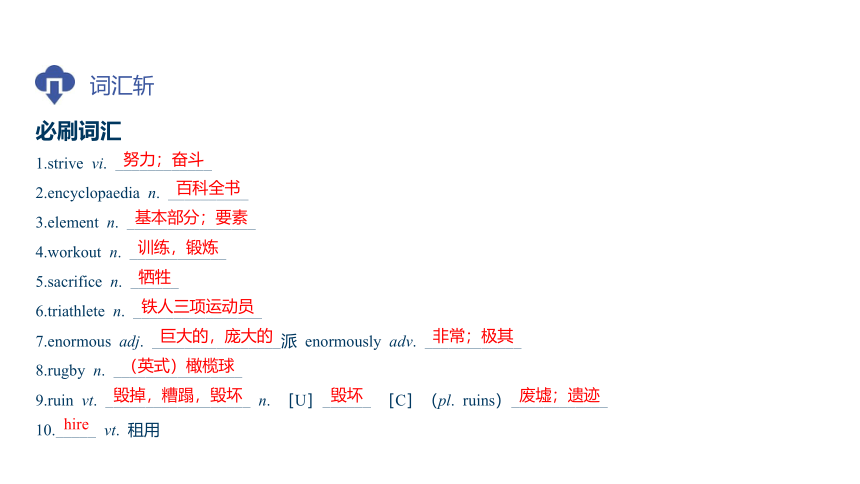
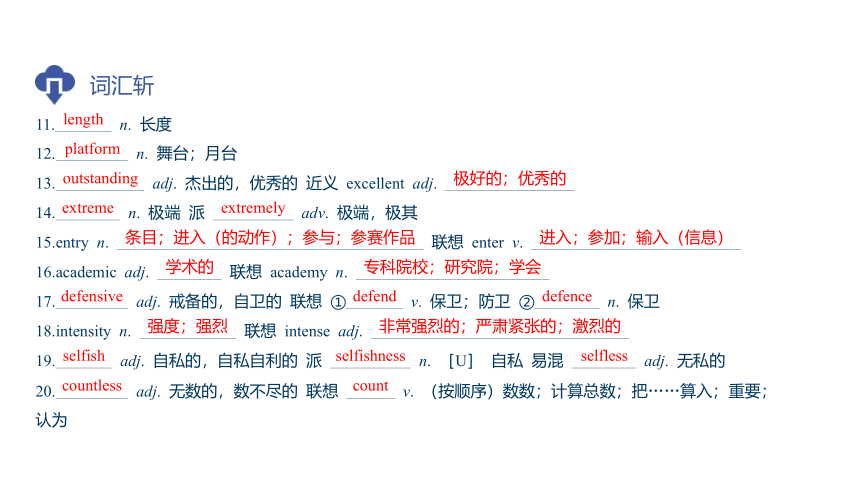
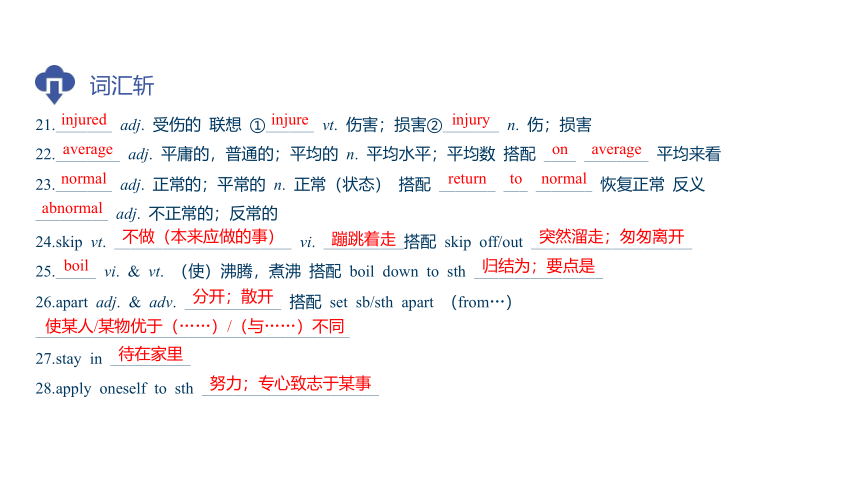
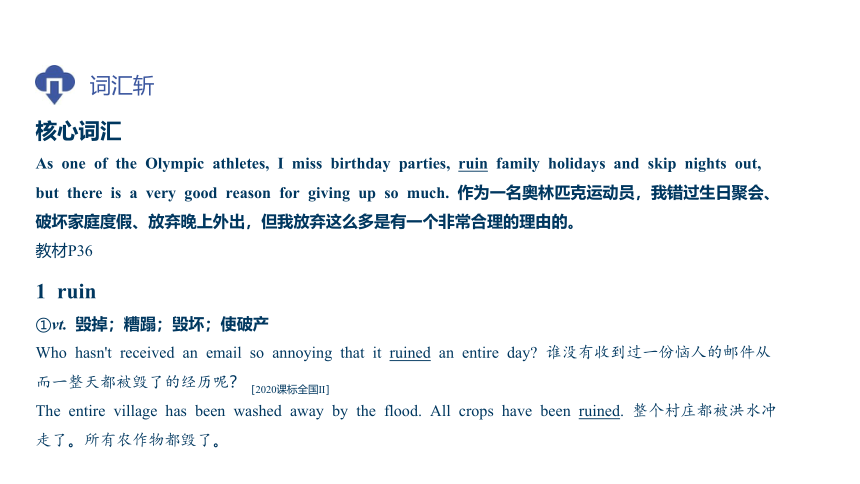
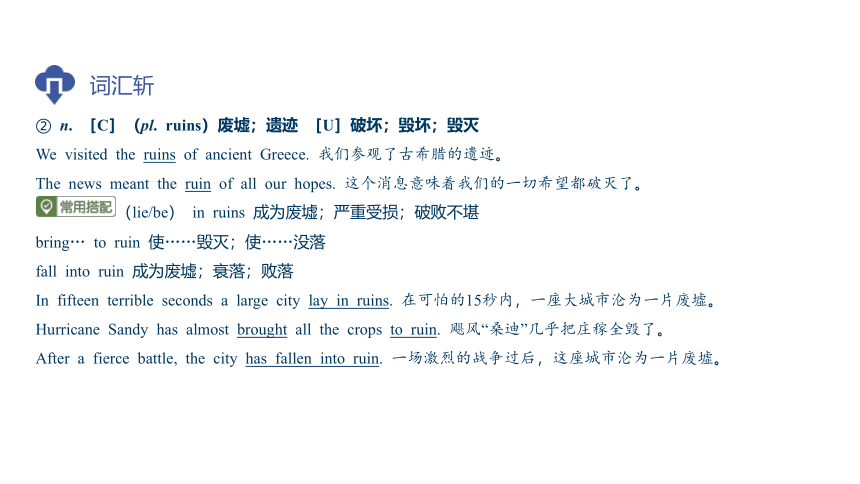
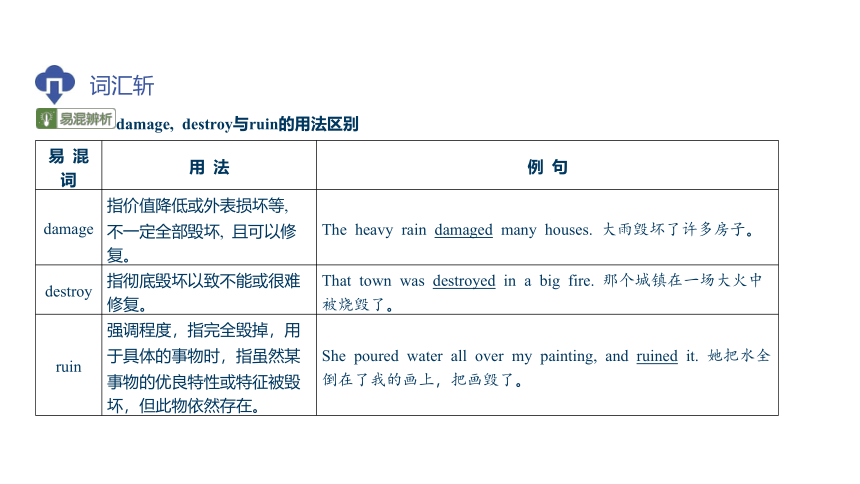
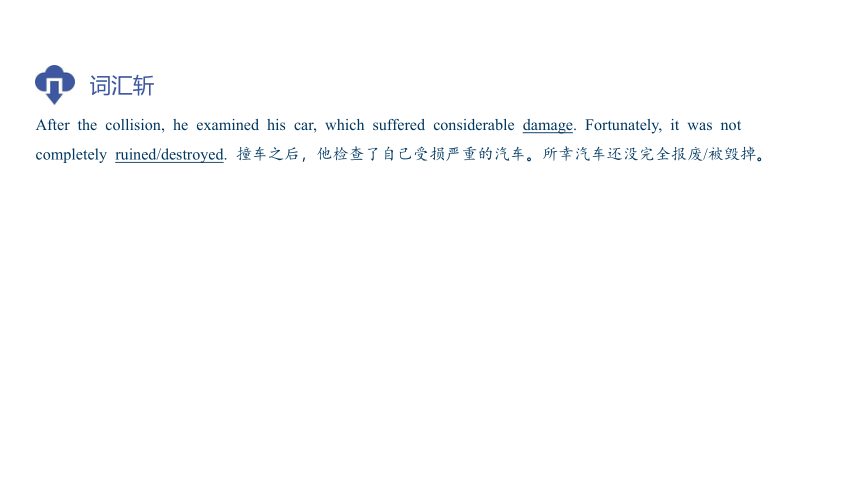
文档简介
(共73张PPT)
Unit 2
Success
Lesson 3
Getting to the Top
必刷词汇
1.strive vi. ____________
努力;奋斗
2.encyclopaedia n. __________
百科全书
3.element n. ________________
基本部分;要素
4.workout n. ____________
训练,锻炼
5.sacrifice n. ______
牺牲
6.triathlete n. ________________
铁人三项运动员
7.enormous adj. ________________派 enormously adv. ____________
巨大的,庞大的
非常;极其
8.rugby n. ________________
(英式)橄榄球
9.ruin vt. __________________ n. [U]______ [C](pl. ruins)____________
毁掉,糟蹋,毁坏
毁坏
废墟;遗迹
10._____ vt. 租用
hire
11._______ n. 长度
length
12._________ n. 舞台;月台
platform
13.___________ adj. 杰出的,优秀的 近义 excellent adj. ________________
outstanding
极好的;优秀的
14.________ n. 极端 派 __________ adv. 极端,极其
extreme
extremely
15.entry n. ______________________________________ 联想 enter v. __________________________
条目;进入(的动作);参与;参赛作品
进入;参加;输入(信息)
16.academic adj. ________ 联想 academy n. ________________________
学术的
专科院校;研究院;学会
17._________ adj. 戒备的,自卫的 联想 ①_______ v. 保卫;防卫 ②________ n. 保卫
defensive
defend
defence
18.intensity n. ____________ 联想 intense adj. ________________________________
强度;强烈
非常强烈的;严肃紧张的;激烈的
19._______ adj. 自私的,自私自利的 派 __________ n. [U] 自私 易混 ________ adj. 无私的
selfish
selfishness
selfless
20._________ adj. 无数的,数不尽的 联想 ______ v. (按顺序)数数;计算总数;把……算入;重要;
认为
countless
count
21._______ adj. 受伤的 联想 ①______ vt. 伤害;损害②_______ n. 伤;损害
injured
injure
injury
22.________ adj. 平庸的,普通的;平均的 n. 平均水平;平均数 搭配 ____ ________ 平均来看
average
on
average
23._______ adj. 正常的;平常的 n. 正常(状态) 搭配 _______ ___ _______ 恢复正常 反义
_________ adj. 不正常的;反常的
normal
return
to
normal
abnormal
24.skip vt. ______________________ vi. __________搭配 skip off/out ____________________
不做(本来应做的事)
蹦跳着走
突然溜走;匆匆离开
25._____ vi. & vt. (使)沸腾,煮沸 搭配 boil down to sth ________________
boil
归结为;要点是
26.apart adj. & adv. ____________ 搭配 set sb/sth apart (from…)
_______________________________________
分开;散开
使某人/某物优于(……)/(与……)不同
27.stay in __________
待在家里
28.apply oneself to sth ______________________
努力;专心致志于某事
核心词汇
As one of the Olympic athletes, I miss birthday parties, ruin family holidays and skip nights out, but there is a very good reason for giving up so much. 作为一名奥林匹克运动员,我错过生日聚会、破坏家庭度假、放弃晚上外出,但我放弃这么多是有一个非常合理的理由的。
教材P36
1 ruin
①vt. 毁掉;糟蹋;毁坏;使破产
Who hasn't received an email so annoying that it ruined an entire day 谁没有收到过一份恼人的邮件从而一整天都被毁了的经历呢?[2020课标全国Ⅱ]
The entire village has been washed away by the flood. All crops have been ruined. 整个村庄都被洪水冲走了。所有农作物都毁了。
② n. [C](pl. ruins)废墟;遗迹 [U]破坏;毁坏;毁灭
We visited the ruins of ancient Greece. 我们参观了古希腊的遗迹。
The news meant the ruin of all our hopes. 这个消息意味着我们的一切希望都破灭了。
&1& (lie/be) in ruins 成为废墟;严重受损;破败不堪
bring… to ruin 使……毁灭;使……没落
fall into ruin 成为废墟;衰落;败落
In fifteen terrible seconds a large city lay in ruins. 在可怕的15秒内,一座大城市沦为一片废墟。
Hurricane Sandy has almost brought all the crops to ruin. 飓风“桑迪”几乎把庄稼全毁了。
After a fierce battle, the city has fallen into ruin. 一场激烈的战争过后,这座城市沦为一片废墟。
&2& damage, destroy与ruin的用法区别
易 混 词 用 法 例 句
damage 指价值降低或外表损坏等, 不一定全部毁坏, 且可以修 复。 The heavy rain damaged many houses. 大雨毁坏了许多房子。
destroy 指彻底毁坏以致不能或很难 修复。 That town was destroyed in a big fire. 那个城镇在一场大火中
被烧毁了。
ruin 强调程度,指完全毁掉,用 于具体的事物时,指虽然某 事物的优良特性或特征被毁 坏,但此物依然存在。 She poured water all over my painting, and ruined it. 她把水全
倒在了我的画上,把画毁了。
After the collision, he examined his car, which suffered considerable damage. Fortunately, it was not completely ruined/destroyed. 撞车之后,他检查了自己受损严重的汽车。所幸汽车还没完全报废/被毁掉。
定向练1
一、在空白处填入1个适当的单词或括号内单词的正确形式。
1.Years of fighting have left the area in ______ (ruin).
ruins
2.At 12, he got a serious illness which _______ (ruin) his health.
ruined
3.The castle now lies ___ ruins.
in
4.A large number of churches fell _____ ruin after the revolution.
into
二、用ruin,damage或destroy的正确形式填空。
1.The bridge was completely _______________ by the explosion.
destroyed/ruined
2.Wind and sand have _______________________ the old castle.
ruined/destroyed/damaged
3.His car got _________ in the accident but it can still be used.
damaged
—I should've just stayed with you instead of following some stupid dream. I've ruined everything. 我就应该和你待在一起,而不是去追随什么愚蠢的梦想。我毁了一切。
—No, kid, no. 不,小鬼,你没有。——《无敌破坏王2:大闹互联网》
I could have become angry or defensive. 我本可以发怒或辩解一下。
教材P36
2 defensive adj.戒备的,自卫的,防御的
Don't get defensive, Charlie. I was only joking. 别这么有防备心,查利。我只不过是在开玩笑。
①defend v. 防御;保卫;为……辩护;辩解
defend against… 防御……
defend oneself 自卫;自我辩护
defend sb against/from sth 保护某人免受某事;针对某事为某人辩护
It is impossible to defend against an all-out attack. 防御全面进攻是不可能的。
②defence n. 保护;保卫;辩护;防御物
come to sb's defence为某人辩护
in sb's defence 为某人辩护
in defence of… 为……辩解/辩护;为保卫……
He realised none of his schoolmates would come to his defence. 他意识到没有一个同学愿意挺身而出为他辩护。
He has mentioned the name of Martin Luther King in defence of his actions. 他提到马丁·路德·金的名字来为自己的行为辩解。
定向练2
在空白处填入1个适当的单词或括号内单词的正确形式。
1.All our officers are trained to defend themselves____________ knife attacks.
against/from
[解析] 句意为:我们所有的警察都接受过自卫训练,能够对付持刀袭击。defend sb against/from sth为固定搭配,意为“保护某人免受某事”。
2.Like their children, parents are often_________ (defence) about their private lives.
defensive
[解析] 句意为:就像子女一样,父母也常常很注重对自己私生活的保护。此处在句中作表语,应用形容词。
3.We must ensure that there is no gap in our ________ (defend).
defence
[解析] 句意为:我们必须确保我们的防御没有漏洞。
4.What talking points can be raised ___defence of this argument
in
[解析] 句意为:能够提出什么论据来为这个论点辩护呢?in defence of… 为固定搭配,意为“为……辩解/辩护”。
I think of countless birthday parties and nights out I have missed… 我想起了我错过的无数个生日聚会和外出的夜晚…… 教材P36
3 countless adj.无数的;数不尽的
释义·理解
count v
①to say numbers in the correct order;
②to calculate the total number;
③to be important;
④to include sb/sth;
⑤to consider sb/sth in a particular way
It has saved my life, and the lives of countless others. 它救了我的命,也救了无数其他人的命。
&3& count vi. (按顺序)数数;重要 vt. & vi. 计算总数 vt. 把……算入;认为;看作
count on/upon 指望;依靠
count… in 把……计算在内
count up to… 数到……
count sb/sth as sb/sth 把某人/某物看作某人/某物
It is not the story itself but what is reflected in the story that counts. 重要的不是这个故事本身,而是这个故事所反映出的问题。
Even as we humans count on forests to absorb a good share of the carbon dioxide we produce, we are threatening their ability to do so. 即使我们指望森林吸收很大一部分人类产生的二氧化碳,但森林的吸收能力正在遭受人类的威胁。
Mark, can we count you in for the cricket team 马克,我们能把你算作板球队的一员吗?
The little boy can count up to 100. 那个小男孩可以数到100。
I count him as my closest friend. 我把他看作我最亲密的朋友。
定向练3
一、在空白处填入1个适当的单词或括号内单词的正确形式。
1.Success is not final, failure is not fatal: It is the courage to continue that _______ (count).
counts
[解析] 此处为强调句,强调主语the courage,故谓语动词应用第三人称单数。
2.She can always be counted ________ for support.
on/upon
[解析] 考查固定短语count on/upon,意为“指望;依靠”。
3.I spent _________ (count) hours on trains and buses.
countless
[解析] 句意为:我在火车和公共汽车上花费了无数时间。名词hours前应用形容词修饰,再由句意可知,设空处应填countless,意为“数不清的;无数的”。
4.That was the likeliest outcome and, on balance, it would be counted ___ a success.
as
[解析] 考查固定短语count sb/sth as sb/sth,意为“把某人/某物看作某人/某物”。
二、根据汉语意思完成句子。
1.那是父亲第一次在紧急时刻依靠我。
That was the first time Dad _____ ________ ________ me in a moment of emergency.
had
counted
on/upon
[解析] 考查动词的时态和固定短语。count on/upon意为“指望;依靠”;That was the first time… 后的从句中谓语应用过去完成时。
2.那个经理需要一个可靠的助手,能够在他不在时处理问题。
The manager needs an assistant _________ ____ _____ ______ ________ to deal with problems in his
absence.
who/that
he
can
count
on/upon
It boils down to this: I was born with an enormous amount of drive and determination. 这归结起来就是:我生来就干劲儿十足,而且有巨大的决心。
教材P36
4 boil down to sth 归结为;要点是(不用于进行时态)
In the end, what it all boils down to is money, or the lack of it. 最终,问题的症结是钱,或者说是缺钱。
&4& boil vi. & vt. (使)沸腾,煮沸;(用开水)煮(食物) vi. 怒火中烧;异常气愤 n. [sing. ]沸腾
boil over 沸腾而溢出
boil sth down (to) 把清单或文章等压缩/简化(到)
The next minute, the porridge boiled over and put out the fire. 顷刻之间,粥沸腾了,溢了出来,还扑灭了炉火。[2021全国新高考Ⅰ]
The original speech I had written got boiled down to about two minutes. 我写的演讲原稿被压缩到了两分钟左右。
Seeing that mistake makes me boil. 看见那个错误让我十分气愤。
定向练4
翻译句子。
1.He was able to boil the report down to a brief summary.
________________________________________
他能够把这篇报告概括成一篇简短的总结。
2.Heat the liquid in a large, wide container rather than a high, narrow one, or it can boil over.
________________________________________________________________________________
应在大而宽的容器中加热这种液体,不要用又高又窄的器皿,否则液体沸腾后会溢出来。
3.你们两个人之间的矛盾归根到底是你们对待该问题的态度不同。
________________________________________________________________________
The conflict between you two boils down to your different attitudes to the issue.
Call it unhealthy if you want, but that is the way I roll, no matter what it is I'm applying myself to. 如果你想说这是不健康的也行,但那就是我做事的方式,不管我做什么,我都会全力以赴。 教材P37
5 apply
① vt. 勤奋工作;努力学习
&5& apply oneself to (doing) sth努力/专心致志于(做)某事
Over the next months, he applied himself to improving the technique. 在接下来的几个月里,他专心致志地改进技术。
释义·理解apply v. ①to work hard; ②to make a formal request;③to use sth;④to put sth onto a surface;⑤to have an effect on sth/sb
② vi. 申请;请求
&6& apply for sth申请某物
apply to… for… 向……申请……
apply to do sth申请/请求做某事
I should apply for the post if I were you. I think you stand a good chance. 如果我是你的话,我会去申请这个职位。我认为你大有希望。
We've applied to the government for a home improvement fund. 我们已经向政府申请用于改善住房条件的拨款。
③ vt. 应用;敷;涂 vi. & vt. (对……)适用
&7& apply… to… 把……应用于……;把……涂/敷到……上
apply to… 适用于……
(上述两个搭配中的to是介词,后接名词、代词或动名词)
Later, I decided to apply my previous experience to learning how to read and write. 后来,我决定把我先前的经验应用到学习如何读写上。
What I have said applies only to some of you. 我所说的只适用于你们当中的一部分人。
&8& ①applicant n. 申请人
②application n. 申请(书);应用
Lasers are finding increasing application in medical science. 激光在医学领域被应用得越来越多。
定向练5
一、在空白处填入1个适当的单词或括号内单词的正确形式。
1.Please clean the wound with a clean cloth and then apply the medicine ___ it.
to
[解析] 句意为:请用干净的布清理伤口然后把药敷到伤口上。在本句中apply… to… 意为“把……敷到……上”。
2.Each ___________ (apply) should be accompanied by a stamped addressed envelope.
application
[解析] 句意为:每一份申请书都应附有一个写明地址、贴好邮票的信封。设空处作主语,表示“申请书”,且其前有Each修饰,故填名词application。
3.We had lots of good __________ (apply) for the job, but one stood out from the rest.
applicants
[解析] 句意为:我们有很多优秀的求职者申请这份工作,但有一位申请者脱颖而出。设空处作第一个并列分句的宾语,表示“申请人”,且其前有lots of修饰,故填名词复数applicants。
4.If you apply yourself ___ the job in hand, you'll soon finish it.
to
[解析] 句意为:如果你专心干手头的工作,你很快就会完成的。
5.Only my cousin has chosen to apply ____ a job in Africa in contrast to the majority of this year's
graduates.
for
[解析] 句意为:与今年大多数毕业生相比,只有我的表弟选择了申请一份在非洲的工作。
二、根据括号内的提示翻译句子。
1.要申请这个专业,我需要具备哪些条件?(apply for)
____________________________________________________
What qualifications should I have to apply for this major
2.他们可以申请加入该组织。(apply to do sth)
_____________________________________
They can apply to join the organisation.
3.我们不仅要知道理论,还要知道如何把它应用到实践中去。 (apply… to…)
________________________________________________________________________
We should not only know the theory but also know how to apply it to practice.
If you want to be an Olympic champion, it's all about that little extra thing you have done in your preparation that will set you apart from your competitors. 如果你想成为奥运冠军,正是你在准备过程中多付出的那额外的一点点会让你在竞争者中脱颖而出。
教材P37
6 set sb/sth apart (from…) 使某人/某物(与……)不同;使某人/某物(从……中)突出
Her elegant style sets her apart from other journalists. 她优雅的风格使她与其他新闻记者截然不同。
What sets him apart from others is his diligence. 使他与众不同的是他的勤奋。
释义·理解
set sb/sth apart (from…), make sb/sth different from or better than others
&9& set sth apart (for sth)留出/拨出某物(用于某事)
Two rooms were set apart for use as libraries. 留出两个房间作为图书室。
定向练6
根据汉语意思完成句子。
1.他们所接受的良好教育使他们与其他的同事截然不同。
Their good education they have received ____________________ other colleagues.
sets them apart from
2.我们应该留出一笔专款给那些灾民们。
We should ___________________ the disaster victims.
set a fund apart for
… “I'd prefer to have three or four outstanding years of winning stuff than having ten years of being average. ”……“我宁愿有三四年的胜利辉煌,也不愿有十年的平庸无为。”
教材P37
7 average
①adj. 普通的;平庸的;平均的
Freddy was an average student, but not an average person. 弗雷迪是一个普通学生,但他不是个普通人。
The coastal area has a pleasant climate, with average temperatures from 24℃ to 26℃. 沿海地区气候宜人,平均气温24到26摄氏度。
② n. 平均数;平均水平
&10& with an average of… 平均为……
an average of… 平均是……
on average 平均
above/below average在平均值以上/以下
With an average of 61 scores, the students seemed to pass the exam. 平均分数为61分,学生们似乎通过了此次考试。
These boats remain at sea for an average of ten days at a time. 这些船只平均每次在海上航行10天。
There is about 400mm rainfall in this area a year on average. 该地区每年平均降雨量约为400毫米。
Her performance last night was well above average, which surprised everyone. 她昨晚的表现远远高于平均水平,这让每个人都感到惊讶。
There have been four years of below average rainfall. 已经有4年降雨量低于平均值了。
定向练7
一、写出下列句子中average的含义。
1.With high technology introduced, the average output of the factory is steadily increasing. ________
平均的
2.Jerry is only an average boy, so don't expect too much from him. ________
普通的
二、用适当的介词填空。
1.Prices have risen by an average ___ four percent over the past year.
of
[解析] 句意为:物价在过去一年中平均上涨了4%。
2.Tom made great progress last term. His marks were _______ average in all the tests.
above
[解析] 句意为:汤姆上学期取得了很大的进步。他所有考试的分数都高于平均分数。
3.____ average, we have five English lessons one week.
On
[解析] 句意为:我们平均一周上五节英语课。
1
【句意】他担心和我一起训练不再是一件愉悦的事情,担心我处于只剩下世界冠军的奖牌而无人可以分享的危险境地。教材P36
&11& that引导的宾语从句
(1)that引导宾语从句时,在句中无实际意义,不作成分,在非正式场合可以省略。
The boy believes that he will travel through space to other planets. 这个男孩相信他将穿越太空,到达其他行星。
(2)当think、 believe、 suppose、 expect等表示“认为”的动词后接宾语从句时,如果主句主语是第一人称并且主句的时态为一般现在时,常把从句中的否定转移至主句。
I don't think he is going to help you with your English. 我认为他不会帮你学英语。
特别注意 宾语从句中引导词that不能省略的情况
①当句中的动词后接两个或两个以上由that引导的宾语从句时,引导第一个宾语从句的that可省略,引导第二个及第二个以后的宾语从句的that一般不省略。
He said (that) you were too young to understand the matter and that he was asked not to tell you. 他说你太年轻,还不能懂这件事,而且有人让他别告诉你。
②当主句的谓语与that引导的宾语从句之间有插入语时,that一般不可省略。
Just then I noticed, for the first time, that our master was wearing his fine green coat and his black silk cap. 就在那时,我第一次注意到我们的雇主穿着他那件华丽的绿色外套,并戴着一顶黑色丝帽。
定向练1
一、在空白处填入1个适当的单词。
1.The mother likes saying _____ she has a good daughter.
that
[解析] 句意为:这位母亲喜欢说她有一个好女儿。设空处引导宾语从句,从句中不缺少必要成分,故填that。
2.I was afraid _____he might fail his exam.
that
[解析] 句意为:我担心他可能无法通过考试。设空处引导宾语从句,从句中不缺少必要成分,故填that。
二、仿照例子改写句子。
例:It's going to rain soon. (I thought)
→I thought (that) it was going to rain soon.
1.He often helps his classmates with their English. (All of us know)
→__________________________________________________________________
All of us know (that) he often helps his classmates with their English.
2.Li Lei has just arrived. (I heard)
→_____________________________________
I heard (that) Li Lei had just arrived.
3.Every step shows in the snow. (He told the students)
→______________________________________________________
He told the students (that) every step shows in the snow.
2
【句意】我本可以发怒或辩解一下。教材P36
&12& “情态动词+have done”表示对过去的虚拟或猜测
①must/can/could/may/might have done sth (肯定/可能/也许做过某事)用于推测过去时间里可能发生的事,其中must have done只能用于肯定推测,表示对否定情况或疑问情况的推测则用can't/couldn't have done或can/could have done。
Philip may/might have hurt seriously in the car accident. I haven't heard from him since then. 菲利普可能在车祸中受了重伤。自那以来,我一直没收到他的来信。
Who could have come here just now I can't find my books. 刚才谁可能来过这儿呢?我找不到我的书了。
I must have forgotten to tell you. 我之前一定是忘了告诉你了。
②could/should/ought to/might/… have done sth 表示“本来能够/应该/可以/……做某事而事实上没做”,用于虚拟语气。
He ought to have thrown the rubbish anyway. 无论如何,他本应该把垃圾扔了。(事实上没扔)
I'm disappointed at the result. I could have done better in the exam. 我对这个成绩很失望,我本来能考得更好。(事实上考得不理想)
③needn't/shouldn't have done sth 表示“本来不必要/不应该做某事而事实上做了”,用于虚拟语气。
You needn't have told them again. I have told them already. 你本来没必要再告诉他们的,我已经告诉他们了。(事实上告诉了)
They shouldn't have cheated in the exam. 他们本不应该在考试中作弊。(事实上作弊了)
定向练2
根据汉语意思完成句子。
1.哈里感觉不舒服,他一定是在昨晚的聚会上喝得太多了。
Harry is feeling uncomfortable. He ______ ______ ______ too much at the party last night.
must
have
drunk
2.你本来没必要买这本书,因为你可以借用我的。
You _______ ______ _______ this book because you could borrow mine.
needn't
have
bought
3.昨天的聚会很有趣。你本来应该来的,为何没来呢?
There was a lot of fun at yesterday's party. You ______ ___ ______ ______/_______ ______ ______ ,
but why didn't you
ought
to
have
come
should
have
come
4.他以前肯定没去过那座城市,因为他对那里一无所知。
He ____________ ______ ______ to that city, because he knows nothing about it.
can't/couldn't
have
been
5.我的钱包不在袋子里,我之前会把它放在哪儿呢?
My wallet isn't in my bag. Where ______ __ ______ ____ it
could
I
have
put
3
【句意】我想起了我错过的无数个生日聚会和外出的夜晚;因为一直寻找一个可以训练的游泳池而破坏了全家在法国的度假;因为忙于在约翰内斯堡市中心租车,并开车通过“禁行”区以便和当地的铁人三项运动员一起骑行,我差点错过我哥哥的婚礼。教材P36
&13& in order to do作目的状语
通常用in order to do或so as to do表示目的(尤其是在不定式结构前使用否定词not等词时)。注意:to do和in order to do的位置既可在句首,又可在句中;而so as to do只能在句中。
To/In order to build a new house, he bought some wood and steel. =He bought some wood and steel to/in order to/so as to build. .a new house. 为了建造新房,他买来了一些木料和钢材。
定向练3
一、在空白处填入括号内单词的正确形式。
1.[全国新高考Ⅱ2022] Eric woke up a little later when he heard children playing outside. He pushed a
chair onto the balcony, and climbed up _______ (see) them.
to see
[解析] 句意为:过了一会儿,埃里克听到外面有孩子玩耍,醒了过来。他把一把椅子推到阳台上,然后爬上去看他们。根据语境可知,此处表目的,应用不定式作目的状语。
2.[课标全国Ⅲ2020] The next morning he hired a boat and set out ________ (find) the well-known
painter.
to find
[解析] 句意为:第二天早上,他租了一艘船,出发去寻找这位著名的画家。结合句意可知,此处在句中作目的状语,设空处应用动词不定式。故填to find。
二、翻译句子。
1.In order to ensure success we must have a complete and thorough plan.
__________________________________________________
为了确保成功,我们必须要有一个完整且详尽的计划。
2.We work hard at English so as to have a good command of it.
________________________________
为了能精通英语,我们苦学英语。
4
【句意】如果你想成为奥运冠军,正是你在准备过程中多付出的那额外的一点点会让你在竞争者中脱颖而出。教材P37
&14& It is/was… that/who…强调句型
(1)强调句常用来突出说话人要强调的语言信息,给对方以强烈的印象和感受。译成汉语时,常加上“是”“正是”等。其基本结构是: It+is/was+被强调成分+that/who+其他成分。
He bought a book in this shop yesterday. 他昨天在这家店买了一本书。
→It was he that/who bought a book in this shop yesterday. 是他昨天在这家店买了一本书。(强调主语 he)
→It was a book that he bought in this shop yesterday. 他昨天在这家店买的是一本书。(强调宾语a book)
→It was in this shop that he bought a book yesterday. 他昨天是在这家店买了一本书。(强调地点状语 in this shop)
(2)含有not… until… 的句子的强调句式:It +is/was+ not until… (被强调成分)+that+其他成分。
He didn't go home until he finished the task. /Not until he finished the task did he go home. →It was not until he finished the task that he went home. 直到完成工作他才回家。
特别注意 ①在强调句型中,It 无任何意义,但不可以换成This或That等。 It is/was和that/who为结构词,去掉后剩下的部分在语法结构和句子含义上均完整,这一点正是强调句和定语从句的本质区别。
②当被强调部分指人时,可以用 who(被强调部分作主语或宾语时)或者whom(被强调部分作宾语时)代替that。
③原句中的谓语动词时态是一般过去时、过去将来时、过去进行时或过去完成时等表过去的时态时,用强调句It was… that/who…;谓语动词表现在的时态时, 用强调句It is… that/who…。
定向练4
在空白处填入1个适当的单词。
1.It is what you do rather than what you say _____matters.
that
[解析] 本句为强调句,强调主语,去掉强调句的结构词, 剩下的是what you do rather than what you say matters,语义完整。
2.It is the ability to do the job _____ matters, not where you come from or what you are.
that
[解析] 本句为强调句,强调的是主语 the ability to do the job,故填that。
3.It is Tom _________ is to blame.
who/that
[解析] 该句为强调句,被强调的部分为主语Tom,指人,故填who/that。
4.It was after he got what he had desired _____ he realised it was not so important.
that
[解析] 该句为强调句, 强调时间状语从句after he got what he had desired。注意这个空不能填when,因为把It was及设空处去掉之后,整个句子成分完整。
5.It was on a cold winter night ______ Tom was waiting for his friend to see a movie with him _____
the accident occurred.
when
that
[解析] 第一空引导定语从句,先行词为a cold winter night,设空处在从句中作时间状语,故用when引导该从句;将句中的It was和第二空去掉后,句子成分完整,故该句为强调句,第二空填that。
6.It was April 29, 2011 ______ Prince William and Kate Middleton walked into the palace hall of the
wedding ceremony.
when
[解析] 去掉It was及设空处后,April 29, 2011不可以单独作时间状语,所以该句不是强调句。此处应用when引导时间状语从句。如果 April 29, 2011前有介词on,那么此句为强调句,此时可填that。
7.It was not until he went to college _____ John realised the importance of time.
that
[解析] 考查not until在强调句中的用法。句意为:直到约翰上了大学之后,他才意识到时间的重要性。
冠词
冠词分为不定冠词a?/an和定冠词the。下面主要讲解它们的典型用法及零冠词的使用情况。
1 不定冠词的用法
①不定冠词可以用于单数可数名词前,表示类别,泛指某一类人或事物;也可以用于专有名词前泛指同类中的某一个人或事物;不定冠词还可以表示不确定的概念, 相当于some 或a certain。
They came on a Sunday and went away on Monday. 他们是在一个星期日来的,在星期一走的。
②不定冠词表示数量“一”的概念,但其数的概念不如one强烈。
I want to buy a pair of new shoes. 我想买双新鞋。
③不定冠词表示“每一”,相当于every或per。
She goes to see her parents twice a month. 她每个月去看望她的父母两次。
④不定冠词用在序数词前,表示“又一;再一”。
He decided to try a seventh time. 他决定再尝试第七次。
⑤用于首次提到的,双方不知道的人或事物前。
There is a park on the corner of the street. 在这条街的拐角处有一个公园。
⑥不定冠词用在of 结构中,表示“相同的”,相当于the same。
They are of an age. 他们同岁。
⑦不定冠词用在一些抽象名词前,表示具体的人或事物,即“抽象名词具体化”。常见的这类抽象名词有: surprise、 success、 failure等。
His coming to the party was a real surprise for me. 他来参加聚会对我来说真的是个惊喜。
⑧不定冠词用在姓氏、名字或“Mr/Mrs+姓氏”等之前,表示“某位……”。
A Smith has just called you. 一个叫史密斯的人刚刚给你打了电话。
⑨不定冠词用在某些固定搭配中。如:a kind of、 in a hurry、 in a short while、 a knowledge of…、 have a… life、 give sb a ride。
2定冠词的用法
①定冠词的基本用法是特指上文已经提到的人或事物,或者说话双方都知道的人或事物。此外,定冠词还可用在被短语或定语从句修饰的名词前,表示特指。
I bought the computer yesterday. 我昨天买的这台电脑。
It's too cold. Close the window please!太冷了。请把这扇窗户关上!
The young man is the student who I taught ten years ago. 这个年轻人是我十年前教过的学生。
特别注意 定冠词the可用在“动词+sb+介词(in/on/by/…)+the+身体部位/衣物”结构中,对所涉及的身体部位或衣物表示强调。该结构中定冠词the相当于物主代词,避免语义重复。
He hit me on the head. 他打了我的头。
②定冠词可用在单数名词前表示类别。
The giant panda in China is loved by people all around the world. 中国大熊猫受到全世界人民的喜爱。(句中提及的大熊猫指的是大熊猫这一类别)
③定冠词用于表示世界上独一无二的事物的名词前。
The sun was low in the sky. 太阳低悬于天空。
④定冠词可用在序数词、形容词最高级前,也可用于形容词的比较级之前,特指“二者之中比较……的”。
The second girl is the tallest of them all. 第二个女孩是他们所有人中最高的。
⑤用在某些形容词前,表示某一类人或事物;或用在姓氏复数形式前,表示“一家人”或“夫妻二人”。
We should pay attention to the development of the young. 我们应该重视年轻人的成长。
The Browns will visit us next week. 布朗一家下周要来看望我们。
⑥在表示“演奏某种乐器”时,用在乐器名称前。
Tom likes playing the guitar. 汤姆喜欢弹吉他。
⑦用在表示海洋、河流、山脉、群岛等的专有名词及国名和党派等的名称前。如:the Yellow River、 the United States、 the Communist Party of China。
⑧用在某些固定搭配中。如: out of the question、 on the contrary、 by the way。
⑨用于表示具体的地点、方位、时间或某一天的一部分等的名词前。如:in the east/south/west/north、 on the right/left、 in the morning。
3零冠词的用法
①可数名词复数及不可数名词表示泛指时。
Monkeys are clever animals. 猴子是聪明的动物。
Milk goes bad easily in summer. 牛奶在夏天很容易变质。
②在表示星期、月份、季节、节日、学科、三餐、球类和棋类等的名词前,不加冠词。如:on Sunday、 in March、 in spring、 on Children's Day。但如果具体到某一年的春、夏、秋、冬,则要加定冠词。
I was born in the autumn of 1985. 我生于1985年秋天。
③某些名词与by连用表示交通方式时。如: by bus/car/bike/train/air/plane/sea/ship。
④表示人名或地名的专有名词前一般不用冠词,如Mike, Shanghai等。但由普通名词构成的专有名词前则要加the,如the United Kingdom。
⑤名词前已有this、 that、 my等指示代词、物主代词、不定代词或名词所有格时,一般不加冠词。
My pen is much more expensive than yours. 我的钢笔比你的贵得多。
⑥某些固定搭配中。如: day and night、 here and there、 at home、 in surprise、 at noon、 on foot、 at night、 on duty、 at work、 on time、 for example、 on show、 in space、 in public。
定向练
一、用定冠词、不定冠词或零冠词填空。
1.When Linda was a child, her mother always let her have ______ breakfast at home.
不填
[解析] have breakfast为固定搭配,若在表示三餐的名词前有形容词修饰,则需加冠词,如have a heavy breakfast。
2.Beyond the stars the astronaut saw nothing but ______ space.
不填
[解析] space表示“太空”时,是不可数名词,其前通常不加冠词。
3.Tom is addicted to playing ______ football.
不填
[解析] 表示“玩……球”时,球类名词前不加冠词。
4.After watching TV, she played ____ violin for an hour.
the
[解析] 表示“弹奏某种乐器”时,乐器名词前应用定冠词。
5.All dogs must be kept on a lead in ______ public places.
不填
[解析] public places是复数名词短语,表示泛指概念,其前不用冠词。
6.Many people agree that ___ knowledge of English is a must in the international trade today.
a
[解析] knowledge与其后的of English构成固定搭配a knowledge of…,故用不定冠词。
7.The train is running fifty miles ____ hour.
an
[解析] 设空处表示“每一”,且hour的发音以元音音素开头,应用不定冠词an。
8.—Do you know ____ lady in blue
—Yes. She is a teacher of a university.
the
[解析] 考查the 表示特指的用法。根据语境可知此处是特指“穿蓝色衣服的那位女士”。
9.He grabbed me by ____ arm and pulled me into the bus.
the
[解析] 此处为“动词+sb+介词+the+身体部位”结构。
10.I hope the activity will be ___ great success and everyone can learn a lot from it.
a
[解析] success在此处为抽象名词具体化,指“一件成功的事”。
二、改正下面句子中的错误。
1.A recent report stated that the number of Spanish speakers in the US would be higher than the number
of English speakers by a year 2090.
______________
year前的a→the
[解析] 此处特指2090年,应用the。
2.If you go by a train, you can have quite a comfortable journey, but make sure you get a fast one.
_____________
删除第一个a
[解析] by train意为“乘火车”,by后接交通工具,此处为零冠词的用法。
3.It is often said that teachers have the very busy life.
_______
the→a
[解析] have a… life为固定搭配,意为“过一种……的生活”。
4.After dinner he gave Mr Richardson ride to the Capital Airport.
____________
在ride前加a
[解析] give sb a ride为固定搭配,意为“让某人搭便车”。
5.A bullet hit the soldier and he was wounded in a leg.
______________
leg前的a→the
[解析] 在第二个并列分句中,谓语动词所涉及的身体部位前应用定冠词the。
6.I knew the John Lennon, but not the famous one.
_____________
第一个the→a
[解析] 表示泛指应用不定冠词。
Maybe if we knew what other people were thinking, we'd know that no one's ordinary. And we all deserve a standing ovation at least once in our lives. 或许,如果我们了解了别人的想法,就会知道,没有人是普通的。每个人一生中都值得大家站起来为他至少鼓一次掌。——《奇迹男孩》
Unit 2
Success
Lesson 3
Getting to the Top
必刷词汇
1.strive vi. ____________
努力;奋斗
2.encyclopaedia n. __________
百科全书
3.element n. ________________
基本部分;要素
4.workout n. ____________
训练,锻炼
5.sacrifice n. ______
牺牲
6.triathlete n. ________________
铁人三项运动员
7.enormous adj. ________________派 enormously adv. ____________
巨大的,庞大的
非常;极其
8.rugby n. ________________
(英式)橄榄球
9.ruin vt. __________________ n. [U]______ [C](pl. ruins)____________
毁掉,糟蹋,毁坏
毁坏
废墟;遗迹
10._____ vt. 租用
hire
11._______ n. 长度
length
12._________ n. 舞台;月台
platform
13.___________ adj. 杰出的,优秀的 近义 excellent adj. ________________
outstanding
极好的;优秀的
14.________ n. 极端 派 __________ adv. 极端,极其
extreme
extremely
15.entry n. ______________________________________ 联想 enter v. __________________________
条目;进入(的动作);参与;参赛作品
进入;参加;输入(信息)
16.academic adj. ________ 联想 academy n. ________________________
学术的
专科院校;研究院;学会
17._________ adj. 戒备的,自卫的 联想 ①_______ v. 保卫;防卫 ②________ n. 保卫
defensive
defend
defence
18.intensity n. ____________ 联想 intense adj. ________________________________
强度;强烈
非常强烈的;严肃紧张的;激烈的
19._______ adj. 自私的,自私自利的 派 __________ n. [U] 自私 易混 ________ adj. 无私的
selfish
selfishness
selfless
20._________ adj. 无数的,数不尽的 联想 ______ v. (按顺序)数数;计算总数;把……算入;重要;
认为
countless
count
21._______ adj. 受伤的 联想 ①______ vt. 伤害;损害②_______ n. 伤;损害
injured
injure
injury
22.________ adj. 平庸的,普通的;平均的 n. 平均水平;平均数 搭配 ____ ________ 平均来看
average
on
average
23._______ adj. 正常的;平常的 n. 正常(状态) 搭配 _______ ___ _______ 恢复正常 反义
_________ adj. 不正常的;反常的
normal
return
to
normal
abnormal
24.skip vt. ______________________ vi. __________搭配 skip off/out ____________________
不做(本来应做的事)
蹦跳着走
突然溜走;匆匆离开
25._____ vi. & vt. (使)沸腾,煮沸 搭配 boil down to sth ________________
boil
归结为;要点是
26.apart adj. & adv. ____________ 搭配 set sb/sth apart (from…)
_______________________________________
分开;散开
使某人/某物优于(……)/(与……)不同
27.stay in __________
待在家里
28.apply oneself to sth ______________________
努力;专心致志于某事
核心词汇
As one of the Olympic athletes, I miss birthday parties, ruin family holidays and skip nights out, but there is a very good reason for giving up so much. 作为一名奥林匹克运动员,我错过生日聚会、破坏家庭度假、放弃晚上外出,但我放弃这么多是有一个非常合理的理由的。
教材P36
1 ruin
①vt. 毁掉;糟蹋;毁坏;使破产
Who hasn't received an email so annoying that it ruined an entire day 谁没有收到过一份恼人的邮件从而一整天都被毁了的经历呢?[2020课标全国Ⅱ]
The entire village has been washed away by the flood. All crops have been ruined. 整个村庄都被洪水冲走了。所有农作物都毁了。
② n. [C](pl. ruins)废墟;遗迹 [U]破坏;毁坏;毁灭
We visited the ruins of ancient Greece. 我们参观了古希腊的遗迹。
The news meant the ruin of all our hopes. 这个消息意味着我们的一切希望都破灭了。
&1& (lie/be) in ruins 成为废墟;严重受损;破败不堪
bring… to ruin 使……毁灭;使……没落
fall into ruin 成为废墟;衰落;败落
In fifteen terrible seconds a large city lay in ruins. 在可怕的15秒内,一座大城市沦为一片废墟。
Hurricane Sandy has almost brought all the crops to ruin. 飓风“桑迪”几乎把庄稼全毁了。
After a fierce battle, the city has fallen into ruin. 一场激烈的战争过后,这座城市沦为一片废墟。
&2& damage, destroy与ruin的用法区别
易 混 词 用 法 例 句
damage 指价值降低或外表损坏等, 不一定全部毁坏, 且可以修 复。 The heavy rain damaged many houses. 大雨毁坏了许多房子。
destroy 指彻底毁坏以致不能或很难 修复。 That town was destroyed in a big fire. 那个城镇在一场大火中
被烧毁了。
ruin 强调程度,指完全毁掉,用 于具体的事物时,指虽然某 事物的优良特性或特征被毁 坏,但此物依然存在。 She poured water all over my painting, and ruined it. 她把水全
倒在了我的画上,把画毁了。
After the collision, he examined his car, which suffered considerable damage. Fortunately, it was not completely ruined/destroyed. 撞车之后,他检查了自己受损严重的汽车。所幸汽车还没完全报废/被毁掉。
定向练1
一、在空白处填入1个适当的单词或括号内单词的正确形式。
1.Years of fighting have left the area in ______ (ruin).
ruins
2.At 12, he got a serious illness which _______ (ruin) his health.
ruined
3.The castle now lies ___ ruins.
in
4.A large number of churches fell _____ ruin after the revolution.
into
二、用ruin,damage或destroy的正确形式填空。
1.The bridge was completely _______________ by the explosion.
destroyed/ruined
2.Wind and sand have _______________________ the old castle.
ruined/destroyed/damaged
3.His car got _________ in the accident but it can still be used.
damaged
—I should've just stayed with you instead of following some stupid dream. I've ruined everything. 我就应该和你待在一起,而不是去追随什么愚蠢的梦想。我毁了一切。
—No, kid, no. 不,小鬼,你没有。——《无敌破坏王2:大闹互联网》
I could have become angry or defensive. 我本可以发怒或辩解一下。
教材P36
2 defensive adj.戒备的,自卫的,防御的
Don't get defensive, Charlie. I was only joking. 别这么有防备心,查利。我只不过是在开玩笑。
①defend v. 防御;保卫;为……辩护;辩解
defend against… 防御……
defend oneself 自卫;自我辩护
defend sb against/from sth 保护某人免受某事;针对某事为某人辩护
It is impossible to defend against an all-out attack. 防御全面进攻是不可能的。
②defence n. 保护;保卫;辩护;防御物
come to sb's defence为某人辩护
in sb's defence 为某人辩护
in defence of… 为……辩解/辩护;为保卫……
He realised none of his schoolmates would come to his defence. 他意识到没有一个同学愿意挺身而出为他辩护。
He has mentioned the name of Martin Luther King in defence of his actions. 他提到马丁·路德·金的名字来为自己的行为辩解。
定向练2
在空白处填入1个适当的单词或括号内单词的正确形式。
1.All our officers are trained to defend themselves____________ knife attacks.
against/from
[解析] 句意为:我们所有的警察都接受过自卫训练,能够对付持刀袭击。defend sb against/from sth为固定搭配,意为“保护某人免受某事”。
2.Like their children, parents are often_________ (defence) about their private lives.
defensive
[解析] 句意为:就像子女一样,父母也常常很注重对自己私生活的保护。此处在句中作表语,应用形容词。
3.We must ensure that there is no gap in our ________ (defend).
defence
[解析] 句意为:我们必须确保我们的防御没有漏洞。
4.What talking points can be raised ___defence of this argument
in
[解析] 句意为:能够提出什么论据来为这个论点辩护呢?in defence of… 为固定搭配,意为“为……辩解/辩护”。
I think of countless birthday parties and nights out I have missed… 我想起了我错过的无数个生日聚会和外出的夜晚…… 教材P36
3 countless adj.无数的;数不尽的
释义·理解
count v
①to say numbers in the correct order;
②to calculate the total number;
③to be important;
④to include sb/sth;
⑤to consider sb/sth in a particular way
It has saved my life, and the lives of countless others. 它救了我的命,也救了无数其他人的命。
&3& count vi. (按顺序)数数;重要 vt. & vi. 计算总数 vt. 把……算入;认为;看作
count on/upon 指望;依靠
count… in 把……计算在内
count up to… 数到……
count sb/sth as sb/sth 把某人/某物看作某人/某物
It is not the story itself but what is reflected in the story that counts. 重要的不是这个故事本身,而是这个故事所反映出的问题。
Even as we humans count on forests to absorb a good share of the carbon dioxide we produce, we are threatening their ability to do so. 即使我们指望森林吸收很大一部分人类产生的二氧化碳,但森林的吸收能力正在遭受人类的威胁。
Mark, can we count you in for the cricket team 马克,我们能把你算作板球队的一员吗?
The little boy can count up to 100. 那个小男孩可以数到100。
I count him as my closest friend. 我把他看作我最亲密的朋友。
定向练3
一、在空白处填入1个适当的单词或括号内单词的正确形式。
1.Success is not final, failure is not fatal: It is the courage to continue that _______ (count).
counts
[解析] 此处为强调句,强调主语the courage,故谓语动词应用第三人称单数。
2.She can always be counted ________ for support.
on/upon
[解析] 考查固定短语count on/upon,意为“指望;依靠”。
3.I spent _________ (count) hours on trains and buses.
countless
[解析] 句意为:我在火车和公共汽车上花费了无数时间。名词hours前应用形容词修饰,再由句意可知,设空处应填countless,意为“数不清的;无数的”。
4.That was the likeliest outcome and, on balance, it would be counted ___ a success.
as
[解析] 考查固定短语count sb/sth as sb/sth,意为“把某人/某物看作某人/某物”。
二、根据汉语意思完成句子。
1.那是父亲第一次在紧急时刻依靠我。
That was the first time Dad _____ ________ ________ me in a moment of emergency.
had
counted
on/upon
[解析] 考查动词的时态和固定短语。count on/upon意为“指望;依靠”;That was the first time… 后的从句中谓语应用过去完成时。
2.那个经理需要一个可靠的助手,能够在他不在时处理问题。
The manager needs an assistant _________ ____ _____ ______ ________ to deal with problems in his
absence.
who/that
he
can
count
on/upon
It boils down to this: I was born with an enormous amount of drive and determination. 这归结起来就是:我生来就干劲儿十足,而且有巨大的决心。
教材P36
4 boil down to sth 归结为;要点是(不用于进行时态)
In the end, what it all boils down to is money, or the lack of it. 最终,问题的症结是钱,或者说是缺钱。
&4& boil vi. & vt. (使)沸腾,煮沸;(用开水)煮(食物) vi. 怒火中烧;异常气愤 n. [sing. ]沸腾
boil over 沸腾而溢出
boil sth down (to) 把清单或文章等压缩/简化(到)
The next minute, the porridge boiled over and put out the fire. 顷刻之间,粥沸腾了,溢了出来,还扑灭了炉火。[2021全国新高考Ⅰ]
The original speech I had written got boiled down to about two minutes. 我写的演讲原稿被压缩到了两分钟左右。
Seeing that mistake makes me boil. 看见那个错误让我十分气愤。
定向练4
翻译句子。
1.He was able to boil the report down to a brief summary.
________________________________________
他能够把这篇报告概括成一篇简短的总结。
2.Heat the liquid in a large, wide container rather than a high, narrow one, or it can boil over.
________________________________________________________________________________
应在大而宽的容器中加热这种液体,不要用又高又窄的器皿,否则液体沸腾后会溢出来。
3.你们两个人之间的矛盾归根到底是你们对待该问题的态度不同。
________________________________________________________________________
The conflict between you two boils down to your different attitudes to the issue.
Call it unhealthy if you want, but that is the way I roll, no matter what it is I'm applying myself to. 如果你想说这是不健康的也行,但那就是我做事的方式,不管我做什么,我都会全力以赴。 教材P37
5 apply
① vt. 勤奋工作;努力学习
&5& apply oneself to (doing) sth努力/专心致志于(做)某事
Over the next months, he applied himself to improving the technique. 在接下来的几个月里,他专心致志地改进技术。
释义·理解apply v. ①to work hard; ②to make a formal request;③to use sth;④to put sth onto a surface;⑤to have an effect on sth/sb
② vi. 申请;请求
&6& apply for sth申请某物
apply to… for… 向……申请……
apply to do sth申请/请求做某事
I should apply for the post if I were you. I think you stand a good chance. 如果我是你的话,我会去申请这个职位。我认为你大有希望。
We've applied to the government for a home improvement fund. 我们已经向政府申请用于改善住房条件的拨款。
③ vt. 应用;敷;涂 vi. & vt. (对……)适用
&7& apply… to… 把……应用于……;把……涂/敷到……上
apply to… 适用于……
(上述两个搭配中的to是介词,后接名词、代词或动名词)
Later, I decided to apply my previous experience to learning how to read and write. 后来,我决定把我先前的经验应用到学习如何读写上。
What I have said applies only to some of you. 我所说的只适用于你们当中的一部分人。
&8& ①applicant n. 申请人
②application n. 申请(书);应用
Lasers are finding increasing application in medical science. 激光在医学领域被应用得越来越多。
定向练5
一、在空白处填入1个适当的单词或括号内单词的正确形式。
1.Please clean the wound with a clean cloth and then apply the medicine ___ it.
to
[解析] 句意为:请用干净的布清理伤口然后把药敷到伤口上。在本句中apply… to… 意为“把……敷到……上”。
2.Each ___________ (apply) should be accompanied by a stamped addressed envelope.
application
[解析] 句意为:每一份申请书都应附有一个写明地址、贴好邮票的信封。设空处作主语,表示“申请书”,且其前有Each修饰,故填名词application。
3.We had lots of good __________ (apply) for the job, but one stood out from the rest.
applicants
[解析] 句意为:我们有很多优秀的求职者申请这份工作,但有一位申请者脱颖而出。设空处作第一个并列分句的宾语,表示“申请人”,且其前有lots of修饰,故填名词复数applicants。
4.If you apply yourself ___ the job in hand, you'll soon finish it.
to
[解析] 句意为:如果你专心干手头的工作,你很快就会完成的。
5.Only my cousin has chosen to apply ____ a job in Africa in contrast to the majority of this year's
graduates.
for
[解析] 句意为:与今年大多数毕业生相比,只有我的表弟选择了申请一份在非洲的工作。
二、根据括号内的提示翻译句子。
1.要申请这个专业,我需要具备哪些条件?(apply for)
____________________________________________________
What qualifications should I have to apply for this major
2.他们可以申请加入该组织。(apply to do sth)
_____________________________________
They can apply to join the organisation.
3.我们不仅要知道理论,还要知道如何把它应用到实践中去。 (apply… to…)
________________________________________________________________________
We should not only know the theory but also know how to apply it to practice.
If you want to be an Olympic champion, it's all about that little extra thing you have done in your preparation that will set you apart from your competitors. 如果你想成为奥运冠军,正是你在准备过程中多付出的那额外的一点点会让你在竞争者中脱颖而出。
教材P37
6 set sb/sth apart (from…) 使某人/某物(与……)不同;使某人/某物(从……中)突出
Her elegant style sets her apart from other journalists. 她优雅的风格使她与其他新闻记者截然不同。
What sets him apart from others is his diligence. 使他与众不同的是他的勤奋。
释义·理解
set sb/sth apart (from…), make sb/sth different from or better than others
&9& set sth apart (for sth)留出/拨出某物(用于某事)
Two rooms were set apart for use as libraries. 留出两个房间作为图书室。
定向练6
根据汉语意思完成句子。
1.他们所接受的良好教育使他们与其他的同事截然不同。
Their good education they have received ____________________ other colleagues.
sets them apart from
2.我们应该留出一笔专款给那些灾民们。
We should ___________________ the disaster victims.
set a fund apart for
… “I'd prefer to have three or four outstanding years of winning stuff than having ten years of being average. ”……“我宁愿有三四年的胜利辉煌,也不愿有十年的平庸无为。”
教材P37
7 average
①adj. 普通的;平庸的;平均的
Freddy was an average student, but not an average person. 弗雷迪是一个普通学生,但他不是个普通人。
The coastal area has a pleasant climate, with average temperatures from 24℃ to 26℃. 沿海地区气候宜人,平均气温24到26摄氏度。
② n. 平均数;平均水平
&10& with an average of… 平均为……
an average of… 平均是……
on average 平均
above/below average在平均值以上/以下
With an average of 61 scores, the students seemed to pass the exam. 平均分数为61分,学生们似乎通过了此次考试。
These boats remain at sea for an average of ten days at a time. 这些船只平均每次在海上航行10天。
There is about 400mm rainfall in this area a year on average. 该地区每年平均降雨量约为400毫米。
Her performance last night was well above average, which surprised everyone. 她昨晚的表现远远高于平均水平,这让每个人都感到惊讶。
There have been four years of below average rainfall. 已经有4年降雨量低于平均值了。
定向练7
一、写出下列句子中average的含义。
1.With high technology introduced, the average output of the factory is steadily increasing. ________
平均的
2.Jerry is only an average boy, so don't expect too much from him. ________
普通的
二、用适当的介词填空。
1.Prices have risen by an average ___ four percent over the past year.
of
[解析] 句意为:物价在过去一年中平均上涨了4%。
2.Tom made great progress last term. His marks were _______ average in all the tests.
above
[解析] 句意为:汤姆上学期取得了很大的进步。他所有考试的分数都高于平均分数。
3.____ average, we have five English lessons one week.
On
[解析] 句意为:我们平均一周上五节英语课。
1
【句意】他担心和我一起训练不再是一件愉悦的事情,担心我处于只剩下世界冠军的奖牌而无人可以分享的危险境地。教材P36
&11& that引导的宾语从句
(1)that引导宾语从句时,在句中无实际意义,不作成分,在非正式场合可以省略。
The boy believes that he will travel through space to other planets. 这个男孩相信他将穿越太空,到达其他行星。
(2)当think、 believe、 suppose、 expect等表示“认为”的动词后接宾语从句时,如果主句主语是第一人称并且主句的时态为一般现在时,常把从句中的否定转移至主句。
I don't think he is going to help you with your English. 我认为他不会帮你学英语。
特别注意 宾语从句中引导词that不能省略的情况
①当句中的动词后接两个或两个以上由that引导的宾语从句时,引导第一个宾语从句的that可省略,引导第二个及第二个以后的宾语从句的that一般不省略。
He said (that) you were too young to understand the matter and that he was asked not to tell you. 他说你太年轻,还不能懂这件事,而且有人让他别告诉你。
②当主句的谓语与that引导的宾语从句之间有插入语时,that一般不可省略。
Just then I noticed, for the first time, that our master was wearing his fine green coat and his black silk cap. 就在那时,我第一次注意到我们的雇主穿着他那件华丽的绿色外套,并戴着一顶黑色丝帽。
定向练1
一、在空白处填入1个适当的单词。
1.The mother likes saying _____ she has a good daughter.
that
[解析] 句意为:这位母亲喜欢说她有一个好女儿。设空处引导宾语从句,从句中不缺少必要成分,故填that。
2.I was afraid _____he might fail his exam.
that
[解析] 句意为:我担心他可能无法通过考试。设空处引导宾语从句,从句中不缺少必要成分,故填that。
二、仿照例子改写句子。
例:It's going to rain soon. (I thought)
→I thought (that) it was going to rain soon.
1.He often helps his classmates with their English. (All of us know)
→__________________________________________________________________
All of us know (that) he often helps his classmates with their English.
2.Li Lei has just arrived. (I heard)
→_____________________________________
I heard (that) Li Lei had just arrived.
3.Every step shows in the snow. (He told the students)
→______________________________________________________
He told the students (that) every step shows in the snow.
2
【句意】我本可以发怒或辩解一下。教材P36
&12& “情态动词+have done”表示对过去的虚拟或猜测
①must/can/could/may/might have done sth (肯定/可能/也许做过某事)用于推测过去时间里可能发生的事,其中must have done只能用于肯定推测,表示对否定情况或疑问情况的推测则用can't/couldn't have done或can/could have done。
Philip may/might have hurt seriously in the car accident. I haven't heard from him since then. 菲利普可能在车祸中受了重伤。自那以来,我一直没收到他的来信。
Who could have come here just now I can't find my books. 刚才谁可能来过这儿呢?我找不到我的书了。
I must have forgotten to tell you. 我之前一定是忘了告诉你了。
②could/should/ought to/might/… have done sth 表示“本来能够/应该/可以/……做某事而事实上没做”,用于虚拟语气。
He ought to have thrown the rubbish anyway. 无论如何,他本应该把垃圾扔了。(事实上没扔)
I'm disappointed at the result. I could have done better in the exam. 我对这个成绩很失望,我本来能考得更好。(事实上考得不理想)
③needn't/shouldn't have done sth 表示“本来不必要/不应该做某事而事实上做了”,用于虚拟语气。
You needn't have told them again. I have told them already. 你本来没必要再告诉他们的,我已经告诉他们了。(事实上告诉了)
They shouldn't have cheated in the exam. 他们本不应该在考试中作弊。(事实上作弊了)
定向练2
根据汉语意思完成句子。
1.哈里感觉不舒服,他一定是在昨晚的聚会上喝得太多了。
Harry is feeling uncomfortable. He ______ ______ ______ too much at the party last night.
must
have
drunk
2.你本来没必要买这本书,因为你可以借用我的。
You _______ ______ _______ this book because you could borrow mine.
needn't
have
bought
3.昨天的聚会很有趣。你本来应该来的,为何没来呢?
There was a lot of fun at yesterday's party. You ______ ___ ______ ______/_______ ______ ______ ,
but why didn't you
ought
to
have
come
should
have
come
4.他以前肯定没去过那座城市,因为他对那里一无所知。
He ____________ ______ ______ to that city, because he knows nothing about it.
can't/couldn't
have
been
5.我的钱包不在袋子里,我之前会把它放在哪儿呢?
My wallet isn't in my bag. Where ______ __ ______ ____ it
could
I
have
put
3
【句意】我想起了我错过的无数个生日聚会和外出的夜晚;因为一直寻找一个可以训练的游泳池而破坏了全家在法国的度假;因为忙于在约翰内斯堡市中心租车,并开车通过“禁行”区以便和当地的铁人三项运动员一起骑行,我差点错过我哥哥的婚礼。教材P36
&13& in order to do作目的状语
通常用in order to do或so as to do表示目的(尤其是在不定式结构前使用否定词not等词时)。注意:to do和in order to do的位置既可在句首,又可在句中;而so as to do只能在句中。
To/In order to build a new house, he bought some wood and steel. =He bought some wood and steel to/in order to/so as to build. .a new house. 为了建造新房,他买来了一些木料和钢材。
定向练3
一、在空白处填入括号内单词的正确形式。
1.[全国新高考Ⅱ2022] Eric woke up a little later when he heard children playing outside. He pushed a
chair onto the balcony, and climbed up _______ (see) them.
to see
[解析] 句意为:过了一会儿,埃里克听到外面有孩子玩耍,醒了过来。他把一把椅子推到阳台上,然后爬上去看他们。根据语境可知,此处表目的,应用不定式作目的状语。
2.[课标全国Ⅲ2020] The next morning he hired a boat and set out ________ (find) the well-known
painter.
to find
[解析] 句意为:第二天早上,他租了一艘船,出发去寻找这位著名的画家。结合句意可知,此处在句中作目的状语,设空处应用动词不定式。故填to find。
二、翻译句子。
1.In order to ensure success we must have a complete and thorough plan.
__________________________________________________
为了确保成功,我们必须要有一个完整且详尽的计划。
2.We work hard at English so as to have a good command of it.
________________________________
为了能精通英语,我们苦学英语。
4
【句意】如果你想成为奥运冠军,正是你在准备过程中多付出的那额外的一点点会让你在竞争者中脱颖而出。教材P37
&14& It is/was… that/who…强调句型
(1)强调句常用来突出说话人要强调的语言信息,给对方以强烈的印象和感受。译成汉语时,常加上“是”“正是”等。其基本结构是: It+is/was+被强调成分+that/who+其他成分。
He bought a book in this shop yesterday. 他昨天在这家店买了一本书。
→It was he that/who bought a book in this shop yesterday. 是他昨天在这家店买了一本书。(强调主语 he)
→It was a book that he bought in this shop yesterday. 他昨天在这家店买的是一本书。(强调宾语a book)
→It was in this shop that he bought a book yesterday. 他昨天是在这家店买了一本书。(强调地点状语 in this shop)
(2)含有not… until… 的句子的强调句式:It +is/was+ not until… (被强调成分)+that+其他成分。
He didn't go home until he finished the task. /Not until he finished the task did he go home. →It was not until he finished the task that he went home. 直到完成工作他才回家。
特别注意 ①在强调句型中,It 无任何意义,但不可以换成This或That等。 It is/was和that/who为结构词,去掉后剩下的部分在语法结构和句子含义上均完整,这一点正是强调句和定语从句的本质区别。
②当被强调部分指人时,可以用 who(被强调部分作主语或宾语时)或者whom(被强调部分作宾语时)代替that。
③原句中的谓语动词时态是一般过去时、过去将来时、过去进行时或过去完成时等表过去的时态时,用强调句It was… that/who…;谓语动词表现在的时态时, 用强调句It is… that/who…。
定向练4
在空白处填入1个适当的单词。
1.It is what you do rather than what you say _____matters.
that
[解析] 本句为强调句,强调主语,去掉强调句的结构词, 剩下的是what you do rather than what you say matters,语义完整。
2.It is the ability to do the job _____ matters, not where you come from or what you are.
that
[解析] 本句为强调句,强调的是主语 the ability to do the job,故填that。
3.It is Tom _________ is to blame.
who/that
[解析] 该句为强调句,被强调的部分为主语Tom,指人,故填who/that。
4.It was after he got what he had desired _____ he realised it was not so important.
that
[解析] 该句为强调句, 强调时间状语从句after he got what he had desired。注意这个空不能填when,因为把It was及设空处去掉之后,整个句子成分完整。
5.It was on a cold winter night ______ Tom was waiting for his friend to see a movie with him _____
the accident occurred.
when
that
[解析] 第一空引导定语从句,先行词为a cold winter night,设空处在从句中作时间状语,故用when引导该从句;将句中的It was和第二空去掉后,句子成分完整,故该句为强调句,第二空填that。
6.It was April 29, 2011 ______ Prince William and Kate Middleton walked into the palace hall of the
wedding ceremony.
when
[解析] 去掉It was及设空处后,April 29, 2011不可以单独作时间状语,所以该句不是强调句。此处应用when引导时间状语从句。如果 April 29, 2011前有介词on,那么此句为强调句,此时可填that。
7.It was not until he went to college _____ John realised the importance of time.
that
[解析] 考查not until在强调句中的用法。句意为:直到约翰上了大学之后,他才意识到时间的重要性。
冠词
冠词分为不定冠词a?/an和定冠词the。下面主要讲解它们的典型用法及零冠词的使用情况。
1 不定冠词的用法
①不定冠词可以用于单数可数名词前,表示类别,泛指某一类人或事物;也可以用于专有名词前泛指同类中的某一个人或事物;不定冠词还可以表示不确定的概念, 相当于some 或a certain。
They came on a Sunday and went away on Monday. 他们是在一个星期日来的,在星期一走的。
②不定冠词表示数量“一”的概念,但其数的概念不如one强烈。
I want to buy a pair of new shoes. 我想买双新鞋。
③不定冠词表示“每一”,相当于every或per。
She goes to see her parents twice a month. 她每个月去看望她的父母两次。
④不定冠词用在序数词前,表示“又一;再一”。
He decided to try a seventh time. 他决定再尝试第七次。
⑤用于首次提到的,双方不知道的人或事物前。
There is a park on the corner of the street. 在这条街的拐角处有一个公园。
⑥不定冠词用在of 结构中,表示“相同的”,相当于the same。
They are of an age. 他们同岁。
⑦不定冠词用在一些抽象名词前,表示具体的人或事物,即“抽象名词具体化”。常见的这类抽象名词有: surprise、 success、 failure等。
His coming to the party was a real surprise for me. 他来参加聚会对我来说真的是个惊喜。
⑧不定冠词用在姓氏、名字或“Mr/Mrs+姓氏”等之前,表示“某位……”。
A Smith has just called you. 一个叫史密斯的人刚刚给你打了电话。
⑨不定冠词用在某些固定搭配中。如:a kind of、 in a hurry、 in a short while、 a knowledge of…、 have a… life、 give sb a ride。
2定冠词的用法
①定冠词的基本用法是特指上文已经提到的人或事物,或者说话双方都知道的人或事物。此外,定冠词还可用在被短语或定语从句修饰的名词前,表示特指。
I bought the computer yesterday. 我昨天买的这台电脑。
It's too cold. Close the window please!太冷了。请把这扇窗户关上!
The young man is the student who I taught ten years ago. 这个年轻人是我十年前教过的学生。
特别注意 定冠词the可用在“动词+sb+介词(in/on/by/…)+the+身体部位/衣物”结构中,对所涉及的身体部位或衣物表示强调。该结构中定冠词the相当于物主代词,避免语义重复。
He hit me on the head. 他打了我的头。
②定冠词可用在单数名词前表示类别。
The giant panda in China is loved by people all around the world. 中国大熊猫受到全世界人民的喜爱。(句中提及的大熊猫指的是大熊猫这一类别)
③定冠词用于表示世界上独一无二的事物的名词前。
The sun was low in the sky. 太阳低悬于天空。
④定冠词可用在序数词、形容词最高级前,也可用于形容词的比较级之前,特指“二者之中比较……的”。
The second girl is the tallest of them all. 第二个女孩是他们所有人中最高的。
⑤用在某些形容词前,表示某一类人或事物;或用在姓氏复数形式前,表示“一家人”或“夫妻二人”。
We should pay attention to the development of the young. 我们应该重视年轻人的成长。
The Browns will visit us next week. 布朗一家下周要来看望我们。
⑥在表示“演奏某种乐器”时,用在乐器名称前。
Tom likes playing the guitar. 汤姆喜欢弹吉他。
⑦用在表示海洋、河流、山脉、群岛等的专有名词及国名和党派等的名称前。如:the Yellow River、 the United States、 the Communist Party of China。
⑧用在某些固定搭配中。如: out of the question、 on the contrary、 by the way。
⑨用于表示具体的地点、方位、时间或某一天的一部分等的名词前。如:in the east/south/west/north、 on the right/left、 in the morning。
3零冠词的用法
①可数名词复数及不可数名词表示泛指时。
Monkeys are clever animals. 猴子是聪明的动物。
Milk goes bad easily in summer. 牛奶在夏天很容易变质。
②在表示星期、月份、季节、节日、学科、三餐、球类和棋类等的名词前,不加冠词。如:on Sunday、 in March、 in spring、 on Children's Day。但如果具体到某一年的春、夏、秋、冬,则要加定冠词。
I was born in the autumn of 1985. 我生于1985年秋天。
③某些名词与by连用表示交通方式时。如: by bus/car/bike/train/air/plane/sea/ship。
④表示人名或地名的专有名词前一般不用冠词,如Mike, Shanghai等。但由普通名词构成的专有名词前则要加the,如the United Kingdom。
⑤名词前已有this、 that、 my等指示代词、物主代词、不定代词或名词所有格时,一般不加冠词。
My pen is much more expensive than yours. 我的钢笔比你的贵得多。
⑥某些固定搭配中。如: day and night、 here and there、 at home、 in surprise、 at noon、 on foot、 at night、 on duty、 at work、 on time、 for example、 on show、 in space、 in public。
定向练
一、用定冠词、不定冠词或零冠词填空。
1.When Linda was a child, her mother always let her have ______ breakfast at home.
不填
[解析] have breakfast为固定搭配,若在表示三餐的名词前有形容词修饰,则需加冠词,如have a heavy breakfast。
2.Beyond the stars the astronaut saw nothing but ______ space.
不填
[解析] space表示“太空”时,是不可数名词,其前通常不加冠词。
3.Tom is addicted to playing ______ football.
不填
[解析] 表示“玩……球”时,球类名词前不加冠词。
4.After watching TV, she played ____ violin for an hour.
the
[解析] 表示“弹奏某种乐器”时,乐器名词前应用定冠词。
5.All dogs must be kept on a lead in ______ public places.
不填
[解析] public places是复数名词短语,表示泛指概念,其前不用冠词。
6.Many people agree that ___ knowledge of English is a must in the international trade today.
a
[解析] knowledge与其后的of English构成固定搭配a knowledge of…,故用不定冠词。
7.The train is running fifty miles ____ hour.
an
[解析] 设空处表示“每一”,且hour的发音以元音音素开头,应用不定冠词an。
8.—Do you know ____ lady in blue
—Yes. She is a teacher of a university.
the
[解析] 考查the 表示特指的用法。根据语境可知此处是特指“穿蓝色衣服的那位女士”。
9.He grabbed me by ____ arm and pulled me into the bus.
the
[解析] 此处为“动词+sb+介词+the+身体部位”结构。
10.I hope the activity will be ___ great success and everyone can learn a lot from it.
a
[解析] success在此处为抽象名词具体化,指“一件成功的事”。
二、改正下面句子中的错误。
1.A recent report stated that the number of Spanish speakers in the US would be higher than the number
of English speakers by a year 2090.
______________
year前的a→the
[解析] 此处特指2090年,应用the。
2.If you go by a train, you can have quite a comfortable journey, but make sure you get a fast one.
_____________
删除第一个a
[解析] by train意为“乘火车”,by后接交通工具,此处为零冠词的用法。
3.It is often said that teachers have the very busy life.
_______
the→a
[解析] have a… life为固定搭配,意为“过一种……的生活”。
4.After dinner he gave Mr Richardson ride to the Capital Airport.
____________
在ride前加a
[解析] give sb a ride为固定搭配,意为“让某人搭便车”。
5.A bullet hit the soldier and he was wounded in a leg.
______________
leg前的a→the
[解析] 在第二个并列分句中,谓语动词所涉及的身体部位前应用定冠词the。
6.I knew the John Lennon, but not the famous one.
_____________
第一个the→a
[解析] 表示泛指应用不定冠词。
Maybe if we knew what other people were thinking, we'd know that no one's ordinary. And we all deserve a standing ovation at least once in our lives. 或许,如果我们了解了别人的想法,就会知道,没有人是普通的。每个人一生中都值得大家站起来为他至少鼓一次掌。——《奇迹男孩》
同课章节目录
- Unit 1 Relationshis
- Lesson 1 Teachers
- Lesson 2 How Do We Like Teachers’ Feedback?
- Lesson 3 So Close,Yet So Fa
- Unit 2 Success
- Lesson 1 Money vs Success
- Lesson 2 Top Five Secrets of Success
- Lesson 3 Getting to the Top
- Unit 3 Conservation
- Lesson 1 The Sixth Extinction
- Lesson 2 War on Plastic Packets
- Lesson 3 The Road to Destruction
